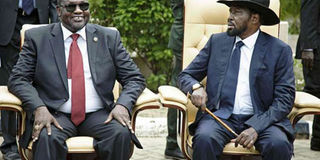Terminate political dominance in South Sudan

This photograph dated April 29, 2016 shows South Sudan's First Vice-President Riek Machar (left), and President Salva Kiir in Juba. PHOTO | ALBERT GONZALEZ FARRAN | AFP
What you need to know:
- Ethno-regional and sectarian warlords have benefited from conflict in South Sudan through organised violence and plunder.
They have organised pogroms against their own people on the grounds of ethnicity, political affiliation, and social geography.
There is no end in sight to South Sudan’s manmade apocalypse so long as its ruling “gun class” runs the show.
These ethno-regional, sectarian warlords have benefited from the conflict through organised violence and plunder. They have organised pogroms against their own people on the grounds of ethnicity, political affiliation, and social geography. The gun class has tapped dangerously into age-old ethnic cleavages as a means of maintaining power, literally, by the barrel of the gun.
The gun class in South Sudan consists of cliques of former “liberators” and Khartoum-sponsored counterinsurgency warlords who fought on both sides of the civil war during the decades-long liberation movement.
The combination of corruption, violence, and intense ethnic mobilisation deployed by the gun class on their own citizens has hijacked the nascent state and its future stability and prosperity. Irrespective of the side on which they fight, the objectives of the gun class remain the same — setting their country on a permanent trajectory of fragility and instability for their own personal gain.
In her recent book, a former head of the UN Mission in South Sudan, Hilde Johnson, identified the transformation of the security sector as the main roadblock to state-building.
Indeed, the absence of political will among the ruling gun class to reduce the number of soldiers and weapons in circulation or reform and professionalise security are the main threat to peace and stability in South Sudan. In the words of Jeremy Astill-Brown, this is a military with a country and not a country with a military – and is, in fact, inching towards being a country without a state.
UNPRECEDENTED LEVELS
Just this past July, the reckless high-stakes gambling of the gun class reached unprecedented levels when the warlords slammed their foot on the accelerator of violence, resulting in full-scale fighting in the capital, Juba, sending the newly returned first vice-president Riek Machar back into the bush.
In his absence, the President of South Sudan, Salva Kiir, handpicked a member of the opposition, Taban Deng Gai, to replace him, and effectively split the opposition into two in what has been described as “Pax Salvatica”.
Now that the peace agreement has been disabled, the government has sought to consolidate its power and has intensified brutal attacks against civilians, including sexual violence, criminality, and the closure of any public space for dissent, including the illegal detention of journalists.
The intransigence and sense of impunity of Juba’s gun class has been emboldened by the lack of accountability for its actions. While it is true that the international community should not determine who South Sudan’s leaders should be, the US and the UN do have an obligation to the people to ensure that the horrific atrocities that have been reported don’t go unpunished. The gun class is immune to diplomatic threats because of the absence of concrete consequences for its actions.
The reality is that South Sudan has relapsed into civil war. The deployment of a regional protection force under the UN peacekeeping mission should be premised on allowing the political re-engineering of the fractured deal under a new architecture of a caretaker administration approved by all stakeholders, including faith and civil society groups.
RIGOROUSLY VETTED
The caretaker government should comprise public personalities and technocrats rigorously vetted for honesty and integrity and should be assisted by the Joint Monitoring and Evaluation Commission tasked with overseeing the implementation of the agreement.
This path would better suit South Sudan than outright trusteeship or temporary UN administration. The caretaker government should exclude both Kiir and Machar, who have proved that they are incapable of transforming themselves into statesmen and civic leaders.
Both men have been linked to war crimes and crimes against humanity by multiple independent UN and African Union investigations.
It is abundantly clear that restoring the status quo ante will be really heavy lifting and, ultimately, will not work. The only path forward to hope, democracy, and prosperity for the people of South Sudan is terminating the political dominance of the gun class and allowing the people to emerge from behind the barrel of the gun.
Dr Majak D’Agoôt is a former deputy minister for Defence in South Sudan, former deputy director-general of Sudan’s intelligence service, and member of Sudan People's Liberation Movement–Leaders. [email protected]
Dr Remember Miamingi is based at the Centre for Human Rights at the University of Pretoria’s Faculty of Law. [email protected]




